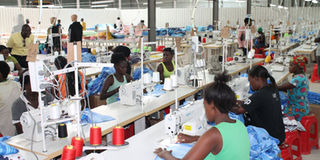Prime
New industrial policy puts emphasis on value addition

Women work in a textlie factory. The industrial value chains targeted for immediate investment are in agro-based industries, such as textiles. PHOTO | Kelvin Atuhaire
What you need to know:
- A statement from the ministry indicates that the new policy passed this month consolidates the achievements of the National Industrial Policy 2008; and gives new direction to the industrial sector for the next 10 years, taking into account the emerging issues in the economy.
Cabinet has approved the National Industrial Policy 2020, which will shape the country’s industrial growth and development over the next 10 years.
According to the Trade Minister, Amelia Kyambadde, the implementation of the new policy takes effect this financial year.
A statement from the ministry indicates that the new policy passed this month consolidates the achievements of the National Industrial Policy 2008; and gives new direction to the industrial sector for the next 10 years, taking into account the emerging issues in the economy.
Over the years, the industrial sector has been growing faster than the policy changes, prompting the ministry to refresh the policy document to keep abreast of the emerging industrial developments.
The new policy will focus on increasing value addition in the abundant local raw materials, increasing exports of manufactured products, creating employment in the industrial sector, and adopting environmentally sustainable technologies in the manufacturing sub sectors.
“Our goal is to increase the manufacturing value added from 8.3 per cent in 2018/19 to 16 per cent by 2029/30,” Ms Kyambadde said while announcing the new development recently at the Media Centre in Kampala.
She continued: “We are looking at increasing and sustaining the supply of quality raw materials for value addition, developing and strengthening skilled human resource to increase productivity and efficiency in the sector and accelerate development and use of research innovations and adoption of appropriate technologies in industry, let alone promoting resource efficient and environmentally sustainable industrialisation.”
Priority
The industrial value chains targeted for immediate investment are in agro- based Industries, specifically: fruits, coffee, cotton, textiles and apparels, tea, cassava, grains, oil seeds, sugar cane, bananas, dairy, leather and leather products.
Extractive based manufacturing industries will also be an area of focus under the new policy with development of value added facilities for resources such as Iron and steel, oil and gas (LPG, synthetics, plastics and petrochemicals), salt, cement and fertilisers.
But the services sector is the largest economic sector of the economy. Its contribution to GDP is beyond 51 per cent with a growth rate of 9.4 per cent, faster than the growth rates in the agriculture and industrial sectors.
This according to economists like Dr Ramathan Ngoobi and Economic Policy Research Centre researcher Isaac Shinyekwa, is bad news. Both economic analysts—Dr Ngoobi and researcher Shinyekwa, say proper economic development is shaped by industrial growth and not through service sector outpacing industrial contribution to the economy.





